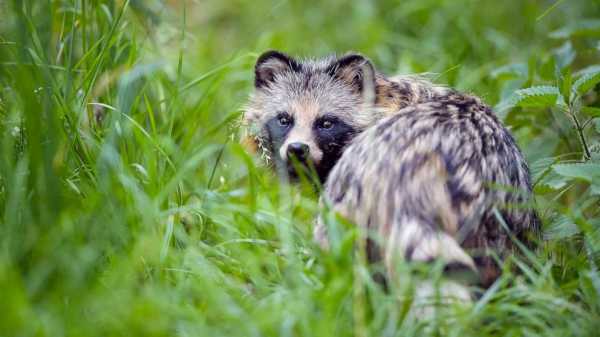A new report suggests the virus that causes COVID-19 may be linked to raccoon dogs that were illegally being sold at a wet seafood market in China.
First reported in The Atlantic, a team of scientists from around the world announced Thursday they believe the virus, SARS-CoV-2, originated at the Huanan Seafood Wholesale Market in Wuhan, where the outbreak began.
It comes amid swirling debate about the origins of the pandemic, after a report from the U.S. Department of Energy concluded with "low confidence" that it was the result of a lab leak.
MORE: What the 'lab leak' theory report about COVID's origins does and doesn't mean
According to the report, researchers at the Chinese Center for Disease Control and Prevention uploaded new data from swab samples collected in January 2020 at the market — including of the floors, walls and cages containing animals — to the open global genome sequencing database GISAID.
From there, the international team, which included virologists and biologists, downloaded the samples and analyzed them.

Members of staff of the Wuhan Hygiene Emergency Response Team conduct searches on the closed Huanan Seafood Wholesale Market in the city of Wuhan, in the Hubei Province, Jan. 11, 2020.Noel Celis/AFP via Getty Images, FILE
The samples that came back positive for the virus also contained genetic material of several animals, particularly large amounts matching the common raccoon dog.
"In samples with a hot amount of virus, there was not a trivial amount of DNA and RNA of raccoon dogs," Dr. Jeremy Kamil, an associate professor of microbiology and immunology at Louisiana State University Health Shreveport, who was not involved in the research, told ABC News.
Although this doesn't definitively prove that the virus definitely jumped from raccoon dogs to humans, the team said it is the strongest evidence to date of the natural transmission theory.
"This is a really strong indication that animals at the market were infected," Dr. Angela Rasmussen, one of the virologists involved in the new report, told The Atlantic. "There's really no other explanation that makes any sense."
Kamil agreed the evidence is not irrefutable, but that it raises serious questions about the trade of animals at these markets.
Members of the research team, who have not yet published their findings, did not immediately return ABC News' request for comment.
MORE: LA assisted living facility faces felony charges over deadly COVID-19 outbreak
The findings also support other scientific research indicating that the virus likely spilled over from animals into people in and around the Huanan Seafood Wholesale Market.
In a briefing Friday morning, the World Health Organization addressed the reports of the potential link to raccoon dogs.
"Last Sunday, WHO was made aware of data published on the GISAID database in late January, and taken down again recently," WHO Director-General Dr. Tedros Adhanom Ghebreyesus said. "The data, from the Chinese Center for Disease Control and Prevention, relates to samples taken at the Huanan market in Wuhan, in 2020, These data do not provide a definitive answer to the question of how the pandemic began, but every piece of data is important in moving us closer to that answer."
Raccoon dogs are known to harbor other viruses that jump from animals to humans. For example, a October 2003 report found a virus very similar to SARS-CoV-1, which a cousin of the new coronavirus, in a raccoon dog and among humans at a live animal market in Guangdong, China.
Although most experts now believe the SARS outbreak in 2002-03 in China was linked to bats, raccoon dogs are believed to have been brief accidental hosts of the virus.
Currently, four U.S. agencies and the National Intelligence Council say the virus was the result of natural transmission that jumped from animals to humans.
Late last month, the Department of Energy changed its stance from "undecided" to "low confidence" that the COVID-19 pandemic "most likely" was the result of a laboratory leak, becoming the second agency, after the FBI, to believe a lab accident resulted in the global health emergency.

Raccoon DogSTOCK PHOTO: Raimund Linke/Getty Images
"This is also in the context that China sees itself as having just as much to lose from a market spillover as it would a lab leak," Kamil said.
China has cracked down on illegal trade and the selling of wildlife at markets across the country since the SARS outbreak of 2002. Kamil said if the virus did come from wildlife, it puts a spotlight on some practices not being enforced.
"If it is a spillover at the market, then it points to the government not enforcing their own laws and allowing illegal trade to occur," he said.
Sourse: abcnews.go.com






